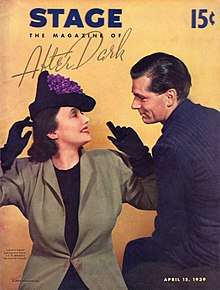No Time for Comedy
No Time for Comedy is a 1940 American comedy-drama film based on the play of the same name by S. N. Behrman, starring James Stewart, Rosalind Russell, Genevieve Tobin and Charlie Ruggles.
| No Time for Comedy | |
|---|---|
 Theatrical release poster | |
| Directed by | William Keighley |
| Produced by | Jack L. Warner |
| Screenplay by | Julius J. Epstein Philip G. Epstein |
| Based on | No Time for Comedy 1939 play by S. N. Behrman |
| Starring | James Stewart Rosalind Russell Genevieve Tobin Charlie Ruggles Lawrence Grossmith Louise Beavers |
| Music by | Heinz Roemheld |
| Cinematography | Ernest Haller |
| Edited by | Owen Marks |
| Distributed by | Warner Brothers |
Release date |
|
Running time | 93 minutes |
| Country | United States |
| Language | English |
Plot summary
Gaylord Esterbrook (Stewart), a reporter from Redfield, Minnesota (pop. 786, including livestock), writes a play about Park Avenue high society, even though he has never been to New York City. The play is being staged, but needs rewriting, so the producers bring Gaylord to New York. He meets the leading lady, Linda Paige (Russell), who initially mistakes him for an usher. The producer eventually loses faith in the play, but Linda persuades the other actors to continue on a cooperative basis. It becomes a success, and Gaylord and Linda get married. Gaylord proceeds to have four hits in four years, all starring Linda.
After his most recent hit, Gaylord meets Amanda Swift (Tobin) at a party. She feels that his talents are being wasted writing comedies. At her urging, he writes a tragedy about immortality called The Way of the World. The play has no part for Linda. Gaylord eventually decides to divorce Linda and marry Amanda. Linda then decides to marry Amanda’s husband, Philo (Ruggles).
The Way of the World is a flop, with audiences laughing at unintentionally funny lines, prompting Amanda to drop Gaylord. However, Linda supports Gaylord in his time of need and they reconcile. She gets the idea for a comedy about smug, contemptible, callous stuffed shirts who think that dictators are inevitable and the average man is bloodthirsty and contemptible. Gaylord and Linda decide to start over, and even act out their initial meeting: Gaylord offers to buy Linda cigarettes as if he were an usher.
Cast
- James Stewart as Gaylord Esterbrook
- Rosalind Russell as Linda Page Esterbrook
- Genevieve Tobin as Amanda Swift
- Charlie Ruggles as Philo Swift
- Allyn Joslyn as Morgan Carrell
- Clarence Kolb as Richard Benson
- Louise Beavers as Clementine
- Robert Greig as Robert
- J. M. Kerrigan as Jim
- Lawrence Grossmith as Frank
- Robert Greig as Robert
- Frank Faylen as Cab Driver
Stage play

S. N. Behrman's play opened on Broadway at the Ethel Barrymore Theatre on April 17, 1939, and ran for 179 performances. The cast included Laurence Olivier as Gaylord Esterbrook and Katharine Cornell as Linda Paige, and was directed by Cornell's husband Guthrie McClintic.
Olivier starred in this play in New York while his lover, Vivien Leigh, was filming Gone With the Wind in Hollywood, causing Leigh stress due to their separation, and according to GWTW lore, influenced her portrayal as Scarlett O'Hara and according to her personal assistant at the time, hurry production so she could be reunited with him.[1]
Radio adaptations
| Date | Program | Stars |
|---|---|---|
| February 9, 1941 | Gulf Screen Guild Theatre | Norma Shearer, Mary Astor, Walter Abel, Hattie McDaniel[2] |
| June 12, 1942 | Philip Morris Playhouse | Melvyn Douglas[3] |
| December 10, 1946 | Hollywood Players | Gregory Peck[4] |
| March 9, 1947 | Theatre Guild on the Air | Florence Eldridge, Frances Fuller, Fredric March[2] |
| October 18, 1953 | Star Playhouse | Rex Harrison, Lilli Palmer[5] |
References
- Gone With the Wind DVD commentary
- "Abel, Walter". radioGOLDINdex. Retrieved 26 May 2015.
- "Philip Morris Playhouse". Harrisburg Telegraph. June 12, 1942. p. 13. Retrieved August 2, 2015 – via Newspapers.com.

- "Tuesday Star". Harrisburg Telegraph. December 7, 1946. p. 19. Retrieved September 12, 2015 – via Newspapers.com.

- Kirby, Walter (October 18, 1953). "Better Radio Programs for the Week". The Decatur Daily Review. p. 48. Retrieved July 6, 2015 – via Newspapers.com.
